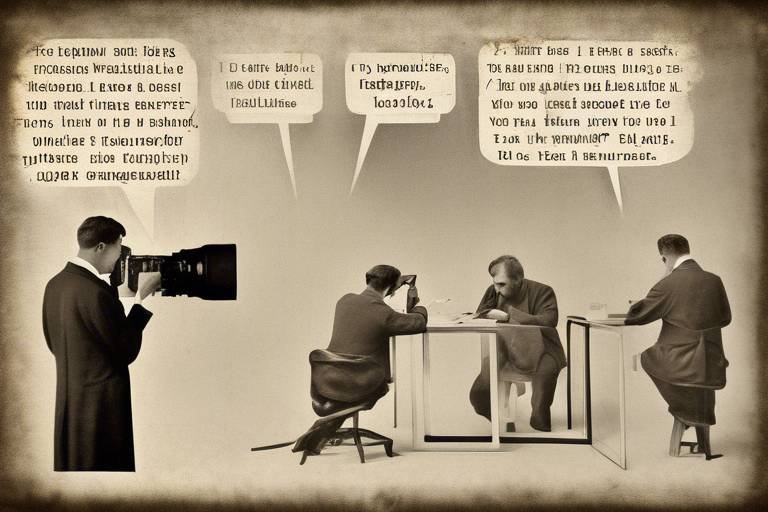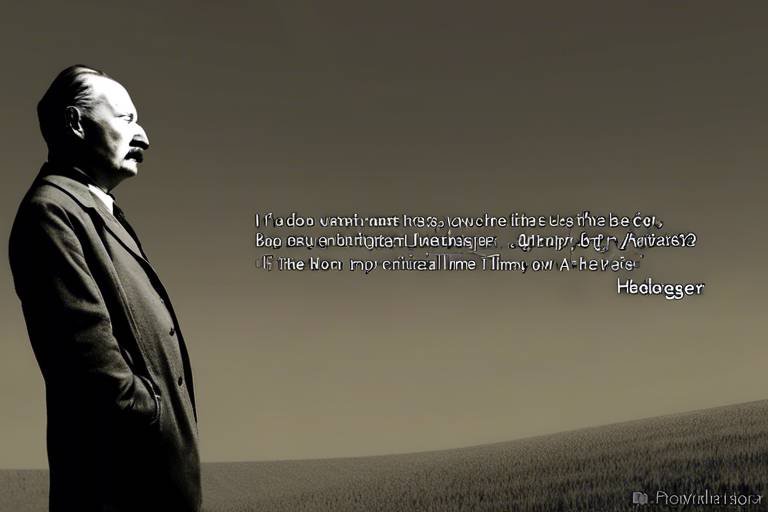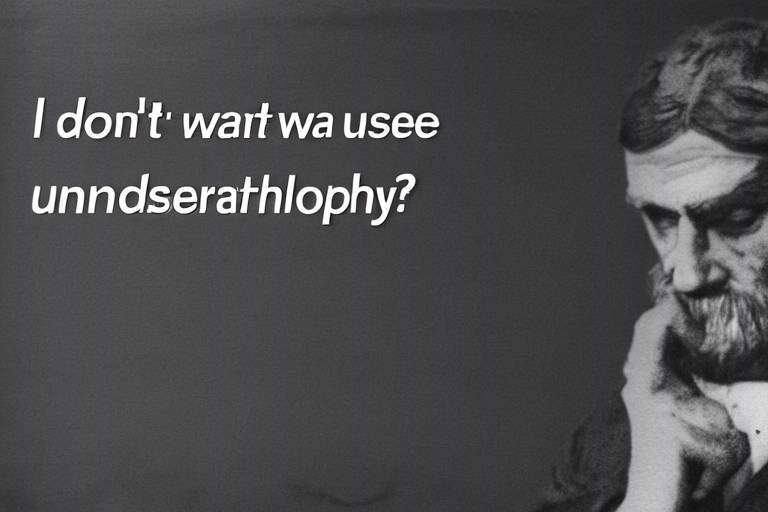The Concept of Philosophy in Everyday Life
Have you ever stopped to think about how the choices you make every day are influenced by philosophical ideas? It's a fascinating concept, isn't it? Philosophy isn't just something you read in dusty old books; it’s a living, breathing part of our daily existence. From the moment you wake up and decide what to eat for breakfast to the complex decisions you face at work or in your relationships, philosophical principles are at play, guiding you, whether you realize it or not. This article explores the profound impact of philosophy on our daily decisions, relationships, and understanding of the world around us, highlighting its practical applications in various aspects of life.
Philosophy is often seen as an abstract discipline, but it has concrete implications for our everyday lives. It helps us navigate the murky waters of existence, knowledge, and ethics. Think about it: when you make a decision, you're not just weighing the pros and cons; you're often guided by deeper principles about what is right, what is just, and what leads to a fulfilling life. Philosophy encourages us to ask the big questions: What does it mean to live a good life? How should we treat others? What is the nature of reality? These questions may seem lofty, but they have practical applications that shape our behavior and decisions.
In a world filled with choices, philosophy acts as a compass, helping us to align our actions with our values. For instance, when faced with a dilemma, you might subconsciously draw on ethical frameworks such as utilitarianism or deontology to guide your decision-making process. This is not just theoretical; it's something we do every day. Whether you’re deciding to volunteer for a community project or choosing how to respond to a friend's request for help, your philosophical beliefs are quietly influencing your choices.
Moreover, think about how philosophy shapes our relationships. The way we perceive love, friendship, and conflict resolution is often rooted in philosophical concepts. For example, consider the idea of reciprocity in friendships. Many people believe that a good friendship is built on mutual respect and support, which echoes philosophical ideas about fairness and justice. When conflicts arise, our understanding of ethics can help us navigate these challenges, leading to healthier, more meaningful connections with others.
As we dive deeper into the role of philosophy in our daily lives, we’ll explore how it influences our decision-making processes, enhances our educational experiences, and even contributes to our mental well-being. By understanding these connections, we can better appreciate the profound impact that philosophy has on our existence. So, are you ready to embark on this journey of self-discovery and insight? Let’s unravel the threads of philosophy woven into the fabric of our everyday lives.
- What is philosophy? Philosophy is the study of fundamental questions regarding existence, knowledge, values, reason, and ethics.
- How does philosophy influence decision-making? Philosophical principles guide our choices by providing frameworks for evaluating what is right or wrong, helping us navigate complex situations.
- Can philosophy improve relationships? Yes, philosophical concepts can enhance our understanding of love, conflict resolution, and the importance of ethics in interpersonal interactions.
- How is philosophy applied in education? Philosophy shapes educational practices by encouraging critical thinking and dialogue, influencing how subjects are taught and learned.
- What role does philosophy play in mental well-being? Philosophical practices, such as mindfulness and Stoicism, can promote emotional resilience and personal growth.

[Understanding Philosophy]
Philosophy is more than just a collection of abstract ideas; it is a dynamic exploration of fundamental questions that shape our existence. At its core, philosophy seeks to answer profound questions about life, knowledge, morality, and the nature of reality. This quest for understanding is what makes philosophy significant in our daily lives. It encourages us to think critically and reflectively, pushing us to examine our beliefs and the world around us.
To grasp the essence of philosophy, one must consider its key branches, which include metaphysics, epistemology, ethics, logic, and aesthetics. Each branch addresses different dimensions of human experience:
| Branch | Description |
|---|---|
| Metaphysics | The study of the nature of reality and existence. |
| Epistemology | The investigation of knowledge, belief, and justification. |
| Ethics | The examination of moral values and principles. |
| Logic | The study of reasoning and argumentation. |
| Aesthetics | The exploration of beauty, art, and taste. |
These branches are interconnected, forming a comprehensive framework that influences how we perceive and interact with the world. For instance, metaphysics helps us ponder questions like "What is reality?" or "Do we have free will?" These inquiries set the stage for our understanding of ethics, which then guides our moral decisions. In this way, philosophy is a living discipline that evolves with human thought and cultural shifts.
The significance of philosophy extends beyond academic circles; it permeates our everyday lives. Think about it: when you make a decision, whether it’s what to eat for dinner or how to respond to a friend in need, you are often unconsciously applying philosophical principles. This is especially true when you consider the ethical implications of your choices. Are you prioritizing your needs over someone else's? Are you considering the long-term effects of your actions? Philosophy encourages us to engage with these questions, fostering a deeper awareness of our responsibilities to ourselves and others.
In conclusion, understanding philosophy is crucial for personal growth and societal development. It invites us to challenge our assumptions and strive for a more profound understanding of life. As we navigate our daily experiences, the philosophical insights we gain can lead to more informed decisions, healthier relationships, and a greater sense of purpose. So, the next time you find yourself pondering a question or facing a dilemma, remember that philosophy is not just an academic discipline; it is a tool for living wisely and meaningfully.

[Philosophy and Decision Making]
Every day, we are faced with countless decisions, from the mundane to the monumental. Have you ever stopped to think about what influences your choices? This is where philosophy comes into play. It’s not just an abstract concept reserved for the halls of academia; it’s a practical tool that shapes our everyday decision-making processes. By understanding different philosophical frameworks, we can better navigate the complexities of our choices and their implications on our lives.
At its core, philosophy encourages us to reflect on our values and beliefs. When we face a decision, we often subconsciously draw upon these principles. For instance, consider how your upbringing and cultural background inform your views on honesty, loyalty, or justice. Each of these concepts has philosophical roots that can guide your actions. By recognizing this connection, we can make more informed decisions that align with our values.
Moreover, philosophy provides us with various ethical frameworks that help us evaluate our choices. These frameworks serve as lenses through which we can analyze situations, weigh potential outcomes, and make decisions that resonate with our moral compass. Here are a few key ethical theories that often influence how we decide:
- Utilitarianism: This principle suggests that the best action is the one that maximizes overall happiness. When faced with a decision, one might consider how their choice affects the greater good.
- Deontology: This approach emphasizes duty and adherence to rules. It encourages individuals to act according to moral obligations, regardless of the consequences.
- Virtue Ethics: Focusing on the character of the decision-maker rather than specific actions, this framework promotes making choices that reflect good character traits.
Let’s delve deeper into two of these frameworks: Utilitarianism and Deontology. Utilitarianism, championed by philosophers like Jeremy Bentham and John Stuart Mill, posits that actions should be evaluated based on their outcomes. For example, if you’re deciding whether to volunteer for a community project, a utilitarian perspective would encourage you to consider how your involvement could benefit the community as a whole. However, this approach can lead to moral dilemmas when the happiness of the majority conflicts with the rights of the minority.
On the other hand, Deontology, associated with Immanuel Kant, focuses on the inherent morality of actions themselves. Kant argued that we should act according to maxims that could be universally applied. So, if you’re faced with a situation where lying could spare someone’s feelings, a deontologist would maintain that honesty is paramount, regardless of the consequences. This strict adherence to duty can sometimes feel rigid, but it provides a clear guideline for decision-making.
In practical terms, understanding these philosophies can significantly influence our daily choices. Whether it’s deciding how to handle a conflict at work or choosing between competing priorities in our personal lives, these ethical frameworks offer valuable insights. They encourage us to think critically about our motivations and the potential impact of our decisions on ourselves and others.
Ultimately, the interplay between philosophy and decision-making highlights the importance of self-reflection. By engaging with philosophical ideas, we can cultivate a deeper understanding of ourselves and the world around us. This not only aids in making better decisions but also fosters personal growth and ethical integrity.
As we navigate through life, let’s remember that our decisions are not just about the outcomes they produce but also about the principles that guide us. Philosophy provides us with the tools to explore these principles, helping us to become more conscious and deliberate in our choices.

[Ethical Frameworks]
When we talk about ethical frameworks, we're diving into the principles that guide our moral compass. These frameworks help us navigate the often murky waters of right and wrong, providing a foundation for our decisions and actions. Imagine you're at a crossroads—each path represents a different ethical theory. Which one do you choose? Understanding these frameworks can clarify our thought processes and help us make choices that align with our values.
At the heart of ethical decision-making are several key theories that offer different perspectives on how we should act. Let's explore some of these frameworks:
- Utilitarianism: This theory suggests that the best action is the one that maximizes overall happiness. It's like a balancing act—considering the consequences of your actions and choosing the option that brings the greatest good to the greatest number.
- Deontology: In contrast, deontological ethics focus on rules and duties. It emphasizes that certain actions are inherently right or wrong, regardless of the outcomes. Think of it as a moral checklist—if an action violates a rule, it’s off the table, no matter how beneficial it might seem.
- Virtue Ethics: This approach centers on the character of the moral agent rather than specific actions. It encourages individuals to cultivate virtues like honesty and courage, leading them to make decisions that reflect a good character.
Each of these frameworks has its strengths and weaknesses, and often, they can lead to different conclusions about the same situation. For instance, consider a scenario where a company must decide whether to lay off employees to save costs. A utilitarian approach might support layoffs if it benefits the majority of stakeholders, while a deontological perspective could argue against it due to the inherent duty to care for employees.
Moreover, ethical frameworks are not just theoretical; they play a significant role in our daily lives. From the choices we make at work to how we interact with friends and family, the principles we subscribe to can shape our behavior and attitudes. Understanding these frameworks allows us to reflect on our decisions and consider the broader implications of our actions.
In a world filled with complex moral dilemmas, having a clear grasp of ethical frameworks can empower us to act with integrity and thoughtfulness. It's not just about making the right choice; it's about understanding why we believe it's right. This reflection can lead to personal growth and a deeper connection with others, as we navigate our shared human experience.
- What is the main difference between utilitarianism and deontology? Utilitarianism focuses on the outcomes of actions to determine their morality, while deontology emphasizes adherence to rules and duties regardless of the consequences.
- Can ethical frameworks conflict with each other? Yes, ethical frameworks can lead to different conclusions in the same situation, creating moral dilemmas that require careful consideration.
- How can I apply these ethical frameworks in my daily life? Reflect on your decisions and consider the principles behind them. Ask yourself questions like, "Does this action promote the greatest good?" or "Am I upholding my duties and responsibilities?"

[Utilitarianism]
Utilitarianism is a fascinating ethical theory that proposes that the rightness or wrongness of an action is determined by its outcomes. To put it simply, it suggests that the best action is the one that maximizes overall happiness or well-being. Imagine you’re at a party with a group of friends, and you have to decide whether to order pizza or sushi. If you choose pizza because it’s the favorite of most people in the group, you’re applying a utilitarian approach. You're aiming for the greatest good for the greatest number, ensuring that the majority enjoys their meal. However, this can also lead to moral dilemmas when the happiness of the majority conflicts with the needs of the minority.
In everyday life, utilitarianism can guide our decisions in various scenarios. For instance, consider a situation where a doctor has five patients in need of organ transplants, but only one organ is available. The utilitarian approach would suggest that the doctor should save the five patients, even if it means sacrificing one. This highlights a critical aspect of utilitarianism: it often requires difficult choices that can weigh heavily on our conscience. The theory raises questions about the value of individual lives versus the collective good, making it a deeply philosophical yet practical consideration in ethical decision-making.
Utilitarianism is not without its critics, however. Some argue that it can justify morally questionable actions if they result in a net increase in happiness. For example, if a government decides to implement a policy that benefits the majority but severely harms a minority, a strict utilitarian perspective might deem it acceptable. This leads to debates about the balance between individual rights and collective welfare. In essence, while utilitarianism provides a clear framework for evaluating actions based on their consequences, it also invites us to reflect critically on the complexities of human experience and moral responsibility.
To better understand utilitarianism, let's take a look at a simple table that outlines its key characteristics:
| Characteristic | Description |
|---|---|
| Focus | Consequences of actions |
| Goal | Maximize overall happiness |
| Decision-making | Weighing benefits against harms |
| Criticism | Can overlook individual rights |
In summary, utilitarianism serves as a powerful lens through which we can evaluate our choices and their impacts on others. It encourages us to think about the broader implications of our actions, pushing us to consider not just our own happiness but the happiness of those around us. As we navigate through life’s moral landscapes, embracing a utilitarian mindset can help us make decisions that promote the greater good, even when the path is fraught with challenges.

[Deontology]
Deontology, derived from the Greek word "deon" meaning duty, is a fascinating ethical framework that emphasizes the importance of rules and obligations in guiding our actions. Unlike consequentialist theories like utilitarianism, which focus primarily on the outcomes of actions, deontological ethics insists that certain actions are inherently right or wrong, regardless of their consequences. Think of it like a moral compass that points us toward our duties, helping us navigate the often murky waters of ethical decision-making in our daily lives.
Imagine you're faced with a difficult decision at work: your boss asks you to bend the rules a little to achieve a project goal that could benefit the company significantly. A consequentialist might argue that the end justifies the means, but a deontologist would remind you of your duty to uphold the integrity of your workplace policies. This unwavering commitment to ethical principles can create a sense of trust and respect among colleagues, fostering a healthier work environment. Deontology encourages us to consider not just what we achieve, but how we achieve it.
One of the most influential figures in deontological ethics is the philosopher Immanuel Kant. Kant believed that moral actions are those performed out of a sense of duty and that we should act according to maxims that could be universally applied. This means that before making a decision, we should ask ourselves: "Would I want everyone to act this way?" If the answer is no, then we should reconsider our choice. Kant’s categorical imperative serves as a guiding principle, urging us to act in ways that respect the inherent dignity of all individuals.
In our personal lives, deontology can play a crucial role in shaping our relationships and interactions. For instance, consider the commitments we make to friends and family. When we promise to be there for someone, a deontological perspective compels us to honor that commitment, regardless of how inconvenient it may be at the time. This adherence to duty fosters trust and reliability, essential components of any strong relationship.
However, deontology is not without its challenges. It can sometimes lead to rigid interpretations of duty that may ignore the complexities of human situations. For example, if a friend confides in you about a serious issue, deontological ethics might dictate that you keep their secret at all costs. But what if that secret poses a risk to their safety or the safety of others? This is where the tension between duty and the consequences of our actions can create moral dilemmas that require careful consideration.
In conclusion, deontology offers a powerful lens through which we can examine our moral obligations and duties. By focusing on the principles that govern our actions, we can cultivate a deeper understanding of ethics in our everyday lives. Whether in our personal relationships or professional settings, the deontological approach encourages us to act with integrity and respect for others, reminding us that our choices matter, not just for ourselves, but for the wider community as well.
- What is deontology? Deontology is an ethical framework that focuses on the morality of actions based on rules and duties rather than the consequences of those actions.
- Who is a key figure in deontological ethics? Immanuel Kant is one of the most influential philosophers associated with deontological ethics.
- How does deontology apply to everyday life? Deontology helps guide our decisions by emphasizing the importance of moral duties, such as keeping promises and adhering to ethical principles.
- What are some challenges of deontological ethics? Deontology can lead to rigid interpretations of duty that may overlook the complexities of specific situations, potentially resulting in moral dilemmas.

[Personal Relationships]
When we think about personal relationships, we often overlook the profound influence that philosophical concepts have on how we connect with others. From the friendships we cultivate to the romantic partnerships we cherish, philosophy provides a lens through which we can better understand our interactions. Have you ever wondered why you feel a certain way about a friend or why conflicts arise in relationships? The answers often lie in the philosophical principles that govern our thoughts and actions.
At the heart of relationships is the concept of love, which philosophers have debated for centuries. Is love an emotion, a choice, or perhaps a combination of both? For instance, the ancient Greeks had multiple words for love: eros (romantic love), philia (friendship), and agape (selfless love). Understanding these distinctions can help us navigate the complexities of our relationships. By recognizing the different forms of love, we can appreciate the unique dynamics in our friendships and partnerships.
Moreover, philosophical ideas about conflict resolution play a crucial role in maintaining healthy relationships. When disagreements arise, it's essential to approach them with a mindset grounded in understanding and empathy. Philosophers like John Stuart Mill emphasized the importance of open dialogue and the exchange of ideas. Instead of viewing conflicts as a battleground, we can see them as opportunities for growth and deeper connection. This shift in perspective can transform how we handle disagreements, fostering a more harmonious atmosphere in our relationships.
Additionally, the concept of trust is foundational in any relationship. Philosophically, trust can be seen as a social contract where both parties agree to be vulnerable with one another. This vulnerability requires a leap of faith, but it is essential for building strong connections. When we trust someone, we allow them into our inner world, creating a bond that is both rewarding and complex. However, this trust can be easily broken, leading to philosophical questions about forgiveness and reconciliation. How do we rebuild trust once it's been shattered? This is where philosophical reflection becomes vital.
In modern relationships, the influence of technology cannot be ignored. Social media and digital communication have transformed how we interact, but they also raise philosophical questions about authenticity and connection. Are we genuinely connecting with others, or are we merely curating an online persona? This dilemma challenges us to reflect on the nature of our relationships in the digital age. Are we fostering meaningful connections, or are we merely skimming the surface of human interaction?
To summarize, philosophy profoundly shapes our personal relationships. By exploring concepts such as love, conflict resolution, trust, and the impact of technology, we gain valuable insights into our interactions with others. Engaging with these philosophical ideas allows us to cultivate deeper, more meaningful connections that enrich our lives. So, the next time you find yourself in a relationship dilemma, take a moment to reflect on the philosophical principles at play. It just might lead you to a clearer understanding of your feelings and actions.
- How can philosophy improve my relationships?
Philosophy encourages self-reflection and critical thinking, which can enhance communication and understanding in relationships. - What role does trust play in relationships?
Trust is fundamental; it allows for vulnerability and deeper connections between individuals. - Can philosophical concepts help in resolving conflicts?
Yes, philosophical principles promote open dialogue and empathy, which are crucial for effective conflict resolution. - How does technology affect personal relationships?
Technology can both enhance and hinder relationships; it’s important to reflect on the authenticity of our interactions in the digital world.

[Philosophy in Education]
Education is not just about acquiring knowledge; it is a profound journey that shapes our thinking, values, and perspectives. At its core, philosophy in education questions the very purpose of teaching and learning. Why do we educate? What methods are most effective? How do we prepare students not just for exams, but for life? These questions invite us to explore the philosophical underpinnings that guide educational practices. By examining different philosophical perspectives, we can understand how they influence everything from curriculum design to classroom dynamics.
One of the key philosophical perspectives in education is the Socratic Method. This ancient technique, attributed to the philosopher Socrates, emphasizes dialogue and critical questioning. Instead of passively receiving information, students engage in discussions that challenge their assumptions and stimulate deeper understanding. Imagine a classroom where students are encouraged to ask questions like, “Why is this important?” or “What if we looked at it this way?” This not only fosters critical thinking but also empowers students to take ownership of their learning.
Another important aspect is the philosophy of education, which examines the goals and methods of education. Different philosophical approaches can lead to vastly different educational outcomes. For instance, a progressive education philosophy emphasizes experiential learning and the development of critical thinking skills, while a more traditional approach may focus on rote memorization and standardized testing. Understanding these philosophies helps educators tailor their teaching methods to better serve their students’ needs.
Moreover, the implications of these philosophical frameworks extend beyond the classroom. They shape societal values and influence how we view education as a whole. For example, the belief in democratic education promotes the idea that every child deserves equal access to quality education, reflecting a commitment to social justice. In contrast, a more elitist philosophy may prioritize the education of a select few, potentially widening societal divides.
To illustrate the impact of different educational philosophies, consider the following table:
| Philosophy | Focus | Educational Approach |
|---|---|---|
| Progressivism | Student-centered learning, critical thinking | Experiential, project-based learning |
| Essentialism | Core knowledge and skills | Structured curriculum, direct instruction |
| Perennialism | Timeless ideas and critical thinking | Classical education, Socratic dialogue |
| Constructivism | Knowledge construction through experience | Collaborative learning, inquiry-based projects |
As we reflect on the role of philosophy in education, it becomes clear that these ideas are not merely theoretical; they have real-world applications that can transform how we teach and learn. By embracing a philosophical approach to education, we can cultivate environments that not only impart knowledge but also inspire students to think critically, engage with their communities, and become lifelong learners.
- What is the Socratic Method? The Socratic Method is a form of cooperative argumentative dialogue that stimulates critical thinking and illuminates ideas through asking questions.
- How does philosophy influence educational practices? Philosophy shapes the goals, methods, and values of education, impacting everything from curriculum design to classroom interactions.
- What are some common educational philosophies? Common educational philosophies include progressivism, essentialism, perennialism, and constructivism, each with its own focus and approach to learning.

[Socratic Method]
The Socratic Method is a fascinating approach to learning that goes beyond rote memorization or passive absorption of information. Instead, it engages students in a dynamic dialogue, sparking critical thinking and deeper understanding. Imagine sitting in a circle, where instead of a teacher lecturing, questions bounce around like a lively game of ping pong. This method encourages participants to explore concepts, challenge assumptions, and articulate their thoughts clearly.
At its core, the Socratic Method is about asking the right questions. Socrates believed that through questioning, individuals could arrive at their own conclusions and gain insights that are far more valuable than mere facts. This approach not only cultivates a deeper understanding of the subject matter but also empowers learners to think independently. It's like giving someone a map instead of just telling them the destination; they learn to navigate the terrain themselves.
In practical terms, the Socratic Method can be implemented in various educational settings. Teachers can pose open-ended questions that require students to think critically and engage in discussions. For example, instead of asking, “What is the capital of France?” a teacher might ask, “Why do you think Paris is considered a cultural hub?” This shift in questioning encourages students to explore ideas rather than just memorize answers.
The effectiveness of the Socratic Method lies in its ability to foster a safe environment for discussion. Students feel more comfortable expressing their thoughts and challenging each other's viewpoints when they know that the goal is not to be right or wrong but to explore ideas collectively. This collaborative atmosphere can lead to richer discussions and a greater appreciation for diverse perspectives.
Moreover, the Socratic Method is not limited to the classroom. It can be applied in everyday conversations, helping individuals navigate complex topics in personal and professional settings. By asking probing questions, we can uncover underlying assumptions and biases, leading to more informed and thoughtful discussions. It's a powerful tool for conflict resolution, as it encourages all parties to consider different viewpoints and work towards mutual understanding.
In summary, the Socratic Method is more than just a teaching technique; it's a way of thinking that can transform how we engage with the world around us. By prioritizing questions over answers, we open ourselves up to a deeper exploration of ideas, fostering a culture of critical thinking and lifelong learning.
- What is the Socratic Method? - The Socratic Method is a form of cooperative argumentative dialogue that stimulates critical thinking through asking and answering questions.
- How can the Socratic Method be applied in everyday life? - It can be used in discussions to explore ideas, resolve conflicts, and encourage deeper understanding among individuals.
- What are the benefits of using the Socratic Method in education? - It promotes active learning, enhances critical thinking skills, and creates a collaborative learning environment.

[Philosophy of Education]
The philosophy of education is a fascinating area that examines the underlying principles and beliefs that shape educational practices. It delves into the very essence of what education means and its purpose in society. At its core, education is not just about imparting knowledge; it's about fostering critical thinking, nurturing creativity, and preparing individuals to navigate the complexities of life. So, what does that really mean for students, teachers, and the educational system as a whole?
There are several key philosophical perspectives that inform the philosophy of education, each offering unique insights into how we approach teaching and learning. For instance, idealism posits that education should focus on developing the mind and spirit, emphasizing the importance of intellectual and moral development. In contrast, realism advocates for a more practical approach, stressing the significance of teaching students about the tangible world around them through observation and experience.
Moreover, progressivism emphasizes the need for education to be relevant to students' lives, encouraging them to engage with real-world problems and develop skills necessary for active participation in society. This perspective often incorporates project-based learning and collaborative activities, allowing students to explore their interests while developing critical skills. In contrast, perennialism focuses on teaching enduring ideas and universal truths, often through the study of classic texts and philosophical works.
To illustrate the impact of these philosophies on educational practices, consider the following table that summarizes the main characteristics of each approach:
| Philosophical Approach | Main Focus | Teaching Methods |
|---|---|---|
| Idealism | Intellectual and moral development | Discussion, Socratic dialogue |
| Realism | Understanding the physical world | Experiential learning, observation |
| Progressivism | Relevance to students' lives | Project-based learning, collaboration |
| Perennialism | Enduring ideas and truths | Study of classic texts, lectures |
Each of these philosophical approaches not only influences the curriculum but also shapes the role of the teacher and the student. For example, in a progressive classroom, the teacher acts as a facilitator, guiding students as they explore and discover knowledge collaboratively. In contrast, in a perennialist setting, the teacher is often seen as the authority figure who imparts knowledge and wisdom from established texts.
Furthermore, the philosophy of education also raises important questions about equity and access within the educational system. How do we ensure that all students, regardless of their background, have the opportunity to benefit from a quality education? This is where the philosophical debate becomes even more critical, as different perspectives can lead to varying conclusions about the best practices for achieving educational equity.
Ultimately, the philosophy of education serves as a foundation for understanding how we teach and learn. It challenges us to reflect on our values and beliefs about education, prompting us to consider questions such as: What is the purpose of education? How can we create an environment that fosters growth and learning for all students? By engaging with these philosophical inquiries, educators and students alike can cultivate a deeper understanding of their roles within the educational landscape.
- What is the importance of philosophy in education?
Philosophy in education helps shape teaching methods, curriculum design, and the overall educational experience, ensuring that it aligns with broader societal values and goals. - How can different philosophical approaches affect teaching?
Different philosophies can influence everything from classroom dynamics to curriculum content, determining whether education is more student-centered or teacher-directed. - Can philosophy improve educational outcomes?
Yes, engaging with philosophical ideas can encourage critical thinking, creativity, and a deeper understanding of complex issues, all of which can enhance educational outcomes.

[Philosophy and Mental Well-being]
In our fast-paced, often chaotic lives, the quest for mental well-being has become more crucial than ever. This is where philosophical inquiry steps in, offering insights and practices that can significantly enhance our emotional resilience and promote personal growth. By integrating philosophical concepts into our daily routines, we can cultivate a deeper understanding of ourselves and the world around us.
One of the most impactful philosophical practices is mindfulness. Rooted in ancient traditions, mindfulness encourages us to live in the present moment, fully experiencing our thoughts and feelings without judgment. This practice can help reduce anxiety and improve our overall mental health. Imagine standing in a bustling city, surrounded by noise and distractions. Instead of feeling overwhelmed, mindfulness teaches you to focus on your breath, grounding you in the now. By doing so, you create a space where stress and worry can dissipate.
Another powerful philosophy that contributes to mental well-being is Stoicism. Stoicism teaches us to differentiate between what we can control and what we cannot. By focusing our energy on our responses and attitudes rather than external events, we can cultivate a sense of peace and resilience. For instance, when faced with a challenging situation, a Stoic approach would encourage us to ask, “What can I learn from this?” rather than succumbing to frustration. This shift in perspective can be transformative, allowing us to navigate life’s ups and downs with grace.
Moreover, philosophical inquiry fosters critical thinking, which can lead to better decision-making and problem-solving skills. When we engage with philosophical questions, we learn to analyze situations more deeply, consider multiple viewpoints, and arrive at well-reasoned conclusions. This process not only enhances our understanding of ourselves but also improves our relationships with others. By communicating more effectively and empathetically, we can resolve conflicts and build stronger connections.
To illustrate the connection between philosophy and mental well-being, consider the following table:
| Philosophical Practice | Benefits |
|---|---|
| Mindfulness | Reduces anxiety, enhances focus, promotes emotional regulation |
| Stoicism | Increases resilience, fosters acceptance, encourages personal growth |
| Critical Thinking | Improves decision-making, enhances problem-solving, strengthens relationships |
Incorporating these philosophical practices into our daily lives can be as simple as setting aside a few moments each day for reflection or journaling. Ask yourself questions like, “What am I grateful for today?” or “How can I respond to challenges with a Stoic mindset?” These small yet profound shifts can lead to a more fulfilling and balanced life.
In conclusion, philosophy is not just an abstract discipline confined to dusty books or academic debates. It is a practical tool that can significantly enhance our mental well-being. By embracing mindfulness, Stoicism, and critical thinking, we can navigate the complexities of life with greater ease, clarity, and purpose. So, why not start today? Dive into the world of philosophical inquiry and discover the transformative power it holds for your mental health.
- How can mindfulness improve my mental health?
Mindfulness helps reduce stress and anxiety by encouraging you to focus on the present moment, enhancing your emotional regulation. - What is Stoicism, and how can it help me?
Stoicism teaches you to focus on what you can control, fostering resilience and promoting personal growth through acceptance. - Can philosophy really change my perspective on life?
Absolutely! Engaging with philosophical ideas encourages critical thinking and helps you analyze situations from different viewpoints, leading to more balanced decisions.
Frequently Asked Questions
- What is philosophy and why is it important in everyday life?
Philosophy is the study of fundamental questions regarding existence, knowledge, values, reason, and ethics. It's important in everyday life because it helps us understand our beliefs, make informed decisions, and navigate complex moral dilemmas. By engaging with philosophical ideas, we can develop critical thinking skills that enhance our interactions and decisions.
- How does philosophy influence decision-making?
Philosophy influences decision-making by providing various frameworks that guide our choices. For instance, utilitarianism encourages us to consider the outcomes of our actions on the greater good, while deontological ethics emphasizes adhering to moral rules. These frameworks help us weigh our options and reflect on the consequences of our decisions.
- What role do ethical frameworks play in our lives?
Ethical frameworks are crucial because they shape our moral compass and guide our behavior in different situations. They help us resolve conflicts, make choices aligned with our values, and understand the implications of our actions on others. By applying these frameworks, we can navigate the complexities of everyday life with a clearer sense of right and wrong.
- Can philosophy improve personal relationships?
Absolutely! Philosophy can enhance personal relationships by fostering better communication, empathy, and understanding. Concepts like love and friendship can be explored through philosophical lenses, allowing us to appreciate different perspectives and resolve conflicts more effectively. This deeper understanding can lead to stronger, more meaningful connections with others.
- How is philosophy integrated into education?
Philosophy is deeply integrated into education through various teaching methods and curricula. The Socratic Method, for example, encourages dialogue and critical questioning, promoting deeper understanding among students. Philosophical perspectives also shape educational practices, influencing how we approach learning and the development of critical thinking skills.
- What is the Socratic Method and how does it benefit students?
The Socratic Method is a form of cooperative argumentative dialogue that stimulates critical thinking. It benefits students by encouraging them to ask questions, challenge assumptions, and engage in thoughtful discussions. This method not only enhances understanding but also fosters a love for learning and curiosity.
- How can philosophy contribute to mental well-being?
Philosophy can significantly contribute to mental well-being through practices like mindfulness and Stoicism. These philosophical approaches encourage self-reflection, emotional resilience, and personal growth. By applying philosophical principles, individuals can develop healthier coping mechanisms, reduce stress, and cultivate a more balanced perspective on life.



















